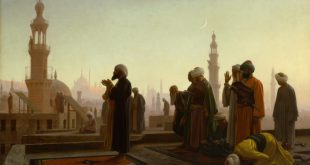on awareness, jealousy, love, and soul
The Lord to his devotee: Love me, love me alone. Love yourself in me, in me alone. Attach yourself to me, No one is more inward than I. Others love you for their own sakes, I love you for yourself. And you, you flee from me. Dearly beloved! … if you approach me, It is because I have approached you. I am nearer to you than yourself, Than your soul, than your breath. Who among creatures Would treat you as I do? I am jealous of you over you, I want you to belong to no other, Not even to yourself. Be mine, be for me as you are in me, Though you are not even aware of it.
on divinity, experience, fatherhood, glory, god, inspiration, privacy, reflection, solution, and time
Averroes (an integrist Aristotelian master): What manner of solution have you found through divine illumination and inspiration? Is it identical with that which we obtain from speculative reflection? Ibn ‘Arabi (a young man about 20 years old): Yes and no. Between the yes and the no, spirits take their flight from their matter, and heads are separated from their bodies. Averroes (in a private interview with Ibn ‘Arabi’s father): Glory be to God who has let me live at a time distinguished by one of the masters of this experience {i.e. Ibn ‘Arabi}, one of those who open the locks of His gates. Glory be to God who has accorded me the personal favor of seeing one of them with my own eyes.
on companions, knowledge, love, and power
The personal Lord speaks only in symbols; his eloquence is all in enigmas. And at a mysterious sign of recognition the visionary is overwhelmed by such a power of love that he loses consciousness. When he comes to himself, his Companion reveals to him: “I am knowledge, I am he who knows and I am what is known.”
on divinity, god, names, reflection, and relationships
God (al-Haqq) is your mirror, that is the mirror in which you contemplate your self (nafs, anima), and you, you are His mirror, that is the mirror in which He contemplates His divine Names. . . . Here we have a reciprocal relationship as between two mirrors facing one another and reflecting the same image back and forth.
on divinity, existence, reality, and soul
He who is the servant of a divine Name is the shadow of that Name, his soul is its epiphanic form (mazhar). But in recognizing that this is so the servant does not negate his own existence. There is indeed a hadith concerning the servant who never ceases to move closer to his Lord; his Lord says of him: “I am his hearing by which he hears, his eyesight by which he sees. . . ” This servant does not become what he was not; what happens is that the “luminous shadow” becomes increasingly transparent. Moreover, the possessive adjective “his” refers explicitly to the reality of the servant or rather presupposes it.
on experience, god, and knowledge
He who knows himself knows his Lord. This Lord is not the impersonal self, nor is it the God of dogmatic definitions, self-subsisting without relation to me, without being experienced by me. He is the he who knows himself through myself, that is, in the knowledge that I have of him, because it is the knowledge that he has of me. . . .
on divinity, names, and sharing
The divine Names are shared by the Lord and His vassal. The Lord is the vassal’s higher self; it is the Lord who acts in him and through him: “When you see the creature, you see the First and the Last, the Manifested and the Hidden.”
on beauty, divinity, experience, investment, love, perception, soul, and world
The Image is not outside him, but within his being; better still, it is his very being, the form of the divine Name which he himself brought with him in coming into being. And the circle of the dialectic of love closes on this fundamental experience: “Love is closer to the lover than is his jugular vein.” So excessive is this nearness that it acts at first as a veil. That is why the inexperienced novice, though dominated by the Image which invests his whole inner being, goes looking for it outside of himself, in a desperate search from form to form of the sensible world, until he returns to the sanctuary of his soul and perceives that the real Beloved is deep within his own being; and, from that moment on, he seeks the Beloved only through the Beloved . . . the active subject within him remains the inner image of unreal Beauty, a vestige of the transcendent or celestial counterpart of his being. . .
 Pasulukan Loka Gandasasmita Agama Berbudaya, Budaya Beragama
Pasulukan Loka Gandasasmita Agama Berbudaya, Budaya Beragama




